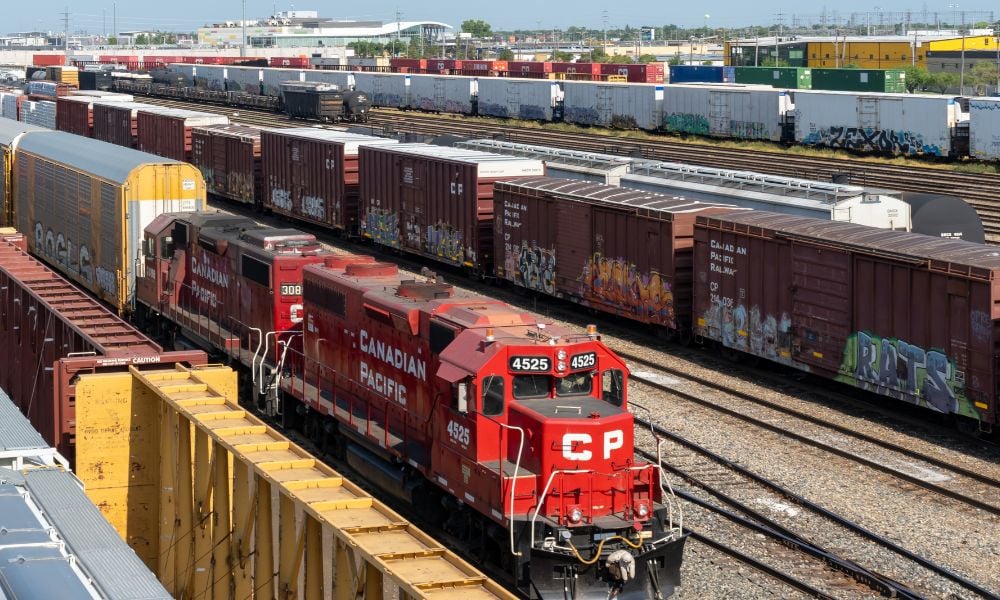
Says effects of collective bargaining between CN, CPKC and Teamsters 'will be borne by all Canadians'

Canada’s labour minister will be stepping into negotiations between the country’s two main rail companies and the union representing their workers.
Steve MacKinnon will be in Montreal today and in Calgary on Wednesday to meet with the parties and federal mediators and urge Canadian National Railway (CN), Canadian Pacific Kansas City (CPKC) and Teamsters (TCRC) to fulfil their responsibility to Canadians, reach agreements at the bargaining table, and prevent a full work stoppage," reported CBC, citing a statement from the minister’s office.
"These collective bargaining negotiations belong to CN Rail, CPKC and TCRC workers alone but their effects will be borne by all Canadians," MacKinnon said, according to the report.
"The parties must do the hard work necessary to reach agreements at the bargaining table and prevent a full work stoppage. Canadians expect the parties' efforts to be equal to the trust conferred on them."
The minister previously called on the parties in the labour dispute to “stay at the bargaining table” and hold “productive and substantive discussions”.
However, on Monday, New Democratic Party (NDP) Leader Jagmeet Singh warned that his party would oppose government intervention in the ongoing negotiations.
"I want to send a clear message to Justin Trudeau and the Liberals. We will oppose any attempt of the federal government to intervene on behalf of the employer against the workers in which should be a negotiated agreement between workers and the employer for good wages and safe working conditions," he told reporters in Halifax, according to CBC.
"For too long we have seen Liberals and Conservatives interfere in these types of labour disputes to the advantage of the employer, to the detriment of the worker. That is wrong and we will oppose that."
Previously, rail workers employed by the two rail companies were given the green light to execute a strike. The Canada Industrial Relations Board (CIRB) ruled that a work stoppage by these workers would pose no "serious danger" to public health or safety, despite concerns around food security, fuel supply and water treatment, reported CTV News.
The decision aligns with what the TCRC, CN and CPKC have long maintained in that there is no need for essential services in the event of a work stoppage in the rail industry, according to the union.
The recent development comes after CN officially issued notice to TCRC formally advising them of its intention to lock out Canadian TCRC-represented employees on Aug. 22 at 00:01 ET unless an agreement or binding arbitration is achieved before that time.
The union represents a combined 9,300 workers at the two railways.
“Despite negotiations over the weekend, no meaningful progress has occurred, and the parties remain very far apart,” CN said.
“Unless there is an immediate and definite resolution to the labour conflict, CN will have no choice but to continue the phased and progressive shutdown of its network which would culminate in a lockout.”
CN claimed that in January, it offered the TCRC “a modernized agreement that improved safety, wages, and work/life balance while protecting acquired rights”, but the union refused the offer.
The employer said it improved on the offer in April with a focus on better wages (75$/hour for Locomotive Engineers and 65$/hour for Conductors), job security, and guaranteed earnings for employees, but the TCRC still refused the improved offer.
CN said that in May, CN also presented a simplified offer within the framework of the existing collective agreement with improved wages and predictable days off, which the TCRC also refused.
“In the absence of a path forward, CN offered to voluntarily submit to binding arbitration in June. Binding arbitration is a process where both parties empower a mutually agreed upon independent arbitrator to determine the terms of a settlement. It is an impartial approach that would achieve a resolution while avoiding a costly disruption to supply chains, Canadian consumers, and the Canadian economy,” said CN. “The TCRC refused this offer.”
However, TCRC previously noted that the main sticking points at the bargaining table are “company demands, not union proposals,” as both companies “want concessions on issues pertaining to crew scheduling, rail safety, and fatigue management”.
Teamsters said that both companies “claim to struggle with labour shortages and are trying to squeeze more out of train crews”. But the ways they’ve chosen to solve the problem is problematic, according to the union.
“Compromising on safety, or threatening to tear families apart for months at a time, are not pathways to an agreement or solutions to staffing problems. CN and CPKC should instead be looking to improve working conditions and adopt a more humane approach to railroading.”
In August 2023, Canada published Regulation SOR/2023-180 – Regulations Amending the Exemptions from and Modifications to Hours of Work Provisions Regulations and the Administrative Monetary Penalties – under the CLC (Amending Regulation), which expands the exemption to additional industries. The Amending Regulation’s Regulatory Impact Statement stated:
“The operational reality in sectors with continuous operations (i.e. those that generally operate 24 hours a day, 7 days a week such as air and rail transportation) and in sectors with unique scheduling practices (such as banking, telecommunications and broadcasting) is such that scheduling flexibility is required…”